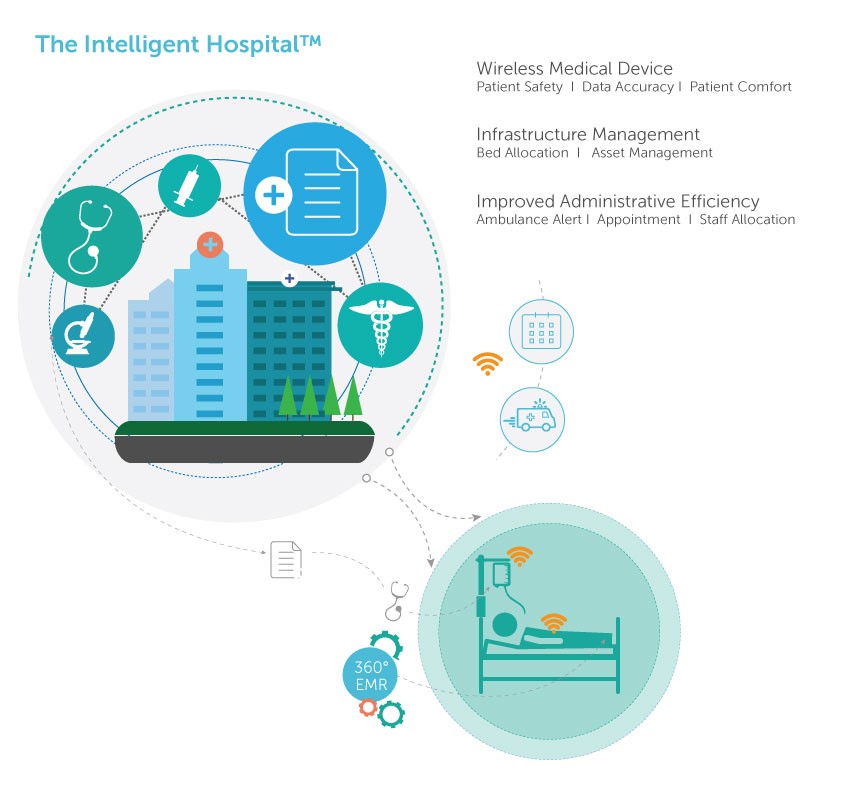The concept of the Intelligent Hospital was introduced by the Radio-Frequency Identification (RFID) in Health Care Consortium in 2009. By placing patient care at the center of all operational systems, the Intelligent Hospital brings together the architecture and design of the hospital space, innovative technology, and best practices in healthcare to achieve optimal patient care.
The Intelligent Hospital connects otherwise disparate clinical activities for more seamless operations. By enabling more automatic exchanges of information, caregivers and staff can provide detailed and effective patient care while equipping healthcare administrators with the insights needed to improve protocols and policies that help increase efficiency and lower costs.

How close are we?
The notion of the Intelligent Hospital has been a welcomed concept by the healthcare industry, but hasn't yet been widely adopted. But many contend that a tipping point is imminent. A perfect storm of variables is backing this notion, including the growth of enabling technologies such as ubiquitous wireless connectivity and device innovation, and widespread digitization of health data. All this while the healthcare industry is needing to overcome seemingly intractable health challenges of access, quality, and cost.
Here are just a few advancements that are making the promise of the Intelligent Hospital a reality:
• The increased prevalence of the Internet of Things (IoT), or "smart connected devices", such as automated infusion pumps that can trigger a change in dosage when needed, to patient monitoring devices that feed data into the patient's electronic health records (EHR), to smart beds that alert staff to changes in status. Real-time location systems (RTLSs) are another example, offering healthcare professionals up-to-the-minute information on availability and location of usable equipment. Tracking these assets, such as hospital beds, monitoring devices, and caregivers, can create more efficiency with resources and streamline personnel allocations, thus lowering costs.
• Improved wireless technology in healthcare environments, including network access, bandwidth, and coverage (RFID, WiFi, Bluetooth), combined with more connected devices, like wireless stethoscopes that transmit assessment data directly to the patient's EHR, and mobile technologies that offer a better patient experience and that improve productivity, enabling physicians to gain access to more specific patient data where and when needed
• Real-time, predictive analytics of structured and unstructured data from multiple sources that have implications for evidence-based, patient-centered care; and population analyses that help the Intelligent Hospital adjust its policies, procedures, personnel, and systems to more efficiently and accurately meet the needs of its patients
Challenges to Adoption
Advancements in connected care, especially within healthcare environments, seem to be accelerating at warp speed, but the integration of design, technology, and patient care is not without its obstacles. For example, security risk, adoption and deployment, and even simply, where to begin. Healthcare organizations can take the right steps to ensure these don't prevent the introduction of new technology and systems toward an Intelligent Hospital, working with technology providers on the right policies and solutions to prevent potential issues.
The Path Forward
Regardless of these challenges, or where the industry is in terms of adoption, it's pretty safe to say that the Intelligent Hospital model is the future of healthcare. Creating an Intelligent Hospital offers healthcare organizations the opportunity to weave a fabric of care, knowledge, information, and skill into a cohesive ecosystem that has the potential to dramatically improve quality of patient care, safety, comfort, and efficiency.
The views, opinions and positions expressed within these guest posts are those of the author alone and do not represent those of Becker's Hospital Review/Becker's Healthcare. The accuracy, completeness and validity of any statements made within this article are not guaranteed. We accept no liability for any errors, omissions or representations. The copyright of this content belongs to the author and any liability with regards to infringement of intellectual property rights remains with them.